Run the following code and answer these 5 questions 1 Bowler
Run the following code and answer these 5 questions:
1. Bowler Name: Harry Merser Highest Score: 235.0 is different from
Bowler Name: Harry Merser Highest Score: 235.0 why??
2. Bowler Name: Harry Merser Highest Score: 235.0 is now the same as
Bowler Name: Harry Merser Highest Score: 235.0 why the change??
3. After changing b1\'s score
b1\'s state is: Bowler Name: Harry Merser Highest Score: 99.0
b2\'s state is: Bowler Name: Harry Merser Highest Score: 99.0
explain what happened
4. Bowler Name: Harry Merser Highest Score: 235.0 is different from
Bowler Name: Harry Merser Highest Score: 235.0 why??
5. Bowler Name: Harry Merser Highest Score: 235.0 is now the same as
Bowler Name: Harry Merser Highest Score: 235.0 why the change??
6. After changing b1\'s score
b1\'s state is: Bowler Name: Harry Merser Highest Score: 99.0
b2\'s state is: Bowler Name: Harry Merser Highest Score: 99.0
explain what happened
/**
* This is a simple class that will be
* used to illustrate the need for an equals( )
*method, a compareTo( ) method and a copy contructor.
*
* @author Bobby
* @version v1
*/
public class Bowler
{
private String name; //the full name of a bowler
private double highScore; //the highest score the bowler has obtained
/** No args constructor
* Create a Bolwler object and sets the name field to the
* string \"unknown\" and
* the high score of this object to 0.
*/
public Bowler( )
{
name = new String(\"unknown\");
highScore = 0;
}
/** Constructs a Bowler object using the values
* of the arguments.
* @param String a name for the Bowler
* @param a high score for the Bowler. If the
* argument sent in is less than zero, the field is set to zero.
*/
public Bowler(String pName, double pHighScore)
{
this.name = new String(pName);
if(pHighScore < 0)
this.highScore = 0;
else
this.highScore = pHighScore;
}
/**
* Sets the Bowler\'s name field to the String argument.
* @param a new value for the Bolwer\'s name
*/
public void setName(String pName)
{
name = new String(pName);
}
/**
* Set\'s the Bolwer object\'s high score field to the
* argument.
* @param the high score field is set to the argument.
* If the argument\'s value is less than zero, the value of the field
* remains unchanged.
*
*/
public void setHighScore(double pHighScore)
{
if(pHighScore >= 0)
this.highScore = pHighScore;
}
/**
* This method returns the the name of the Bowler
* @return a reference to a String object that holds the Bowler\'s name.
*/
public String getName( )
{
return name;
}
/**
* This method returns the value of the Bowler\'s high score.
* @return returns the value of the highSocre field.
*/
public double getHighScore( )
{
return highScore;
}
/**
* Returns the textual representation of a Bowler object.
* @return a reference to a String that concatinates the Bolwer\'s
* name and high socre field values.
*/
public String toString( )
{
return \"Bowler Name: \" + this.name + \" Highest Score: \" + highScore;
}
}
===============================================DRIVER===================================================
/**
* This ia a driver to illustrate the need for some
* special methods.
* @author Bobby
* @version v1
*/
public class BowlerDriver
{
public static void main(String [ ] args)
{
Bowler b1; //declare a reference variable for a Bolwer object
Bowler b2; //declare a reference variable for a Bowler object
b1 = new Bowler(\"Harry Merser\", 235);//create a Bowler
b2 = new Bowler(\"Harry Merser\", 235);//create a Bowler
if(b1 == b2) //use the == operator to test equality
{
System.out.println(b1.toString( ) + \" is the same as \ \" +
b2.toString( )+ \" why??\");
}
else
{
System.out.println(b1.toString( ) + \" is different from\ \" +
b2.toString( ) + \" why??\" );
}
//assign b1 to b2
b1 = b2;
if(b1 == b2)
{
System.out.println(\"\ \" + b1.toString( ) + \" is now the same as \ \" +
b2.toString( ) + \" why the change??\");
}
else
{
System.out.println(b1.toString( ) + \" is different from\ \" +
b2.toString( ) + \" why??\" );
}
//change the b1 high score field to 99
b1.setHighScore(99);
//print the state of each Bowler
System.out.println(\"\ After changing b1\'s score\ b1\'s state is: \"
+ b1.toString( ) +
\"\ b2\'s state is: \" + b2.toString( ) +
\"\ explain what happened\");
}
}
Solution
1. Bowler Name: Harry Merser Highest Score: 235.0 is different from
Bowler Name: Harry Merser Highest Score: 235.0 why??
2. Bowler Name: Harry Merser Highest Score: 235.0 is now the same as
Bowler Name: Harry Merser Highest Score: 235.0 why the change??
3. After changing b1\'s score
b1\'s state is: Bowler Name: Harry Merser Highest Score: 99.0
b2\'s state is: Bowler Name: Harry Merser Highest Score: 99.0
explain what happened
--> In the first question Bowler b1 is not equal to b2 because both the objects have different references with them although the data in both the objects is same.
--> In the second question Bowler b1 is equal to b2 bacause b2\'s reference was assigned to b1 which means that both the objects have same reference now.
--> In the third question when we change the data of b1 the data of b2 automatically changes this is because the reference of both the objects is same.
4. Bowler Name: Harry Merser Highest Score: 235.0 is different from
Bowler Name: Harry Merser Highest Score: 235.0 why??
5. Bowler Name: Harry Merser Highest Score: 235.0 is now the same as
Bowler Name: Harry Merser Highest Score: 235.0 why the change??
6. After changing b1\'s score
b1\'s state is: Bowler Name: Harry Merser Highest Score: 99.0
b2\'s state is: Bowler Name: Harry Merser Highest Score: 99.0
explain what happened
--> The answers of question 4,5,6 os same as the question 1,2,3 respectively.
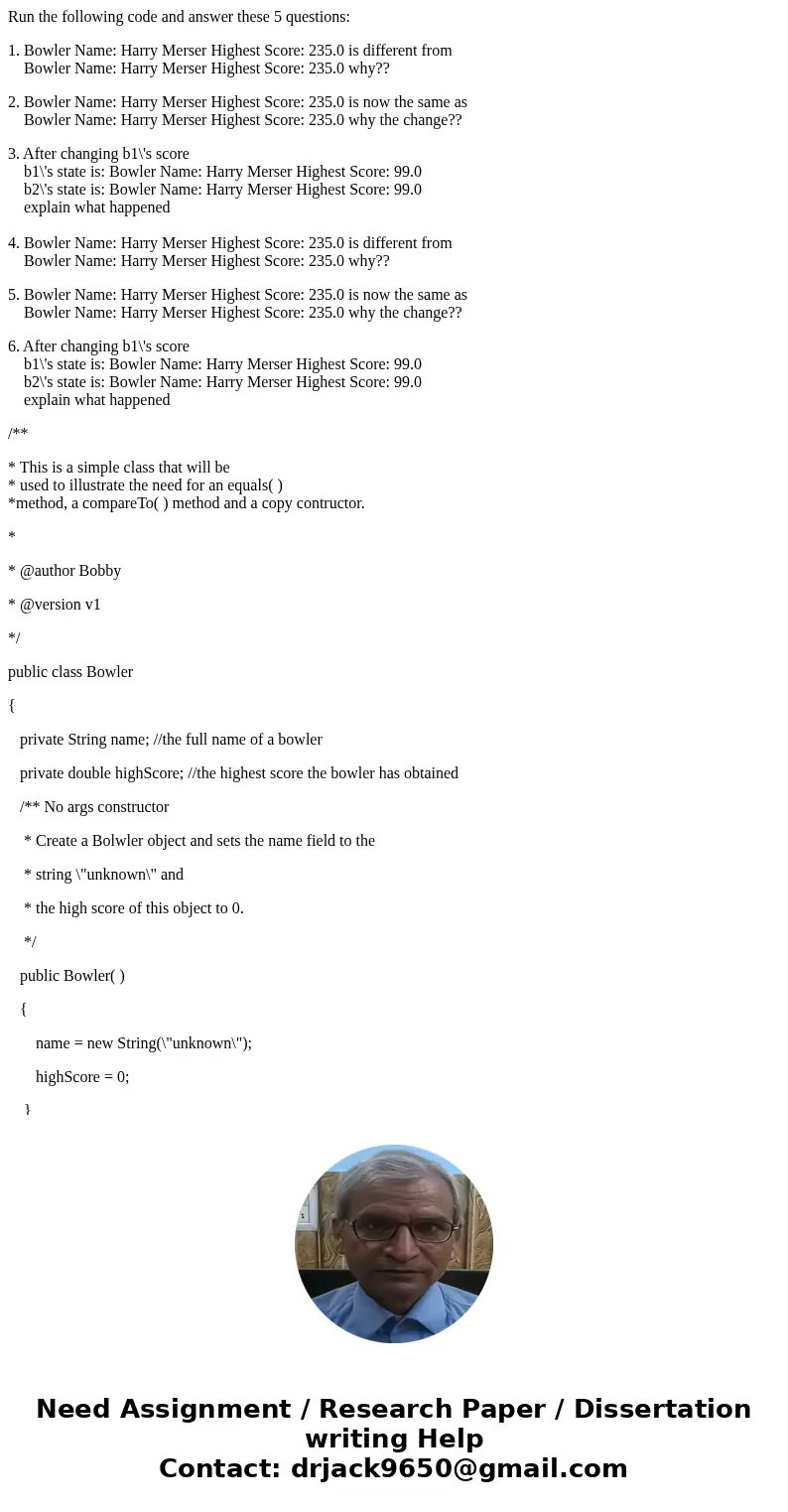
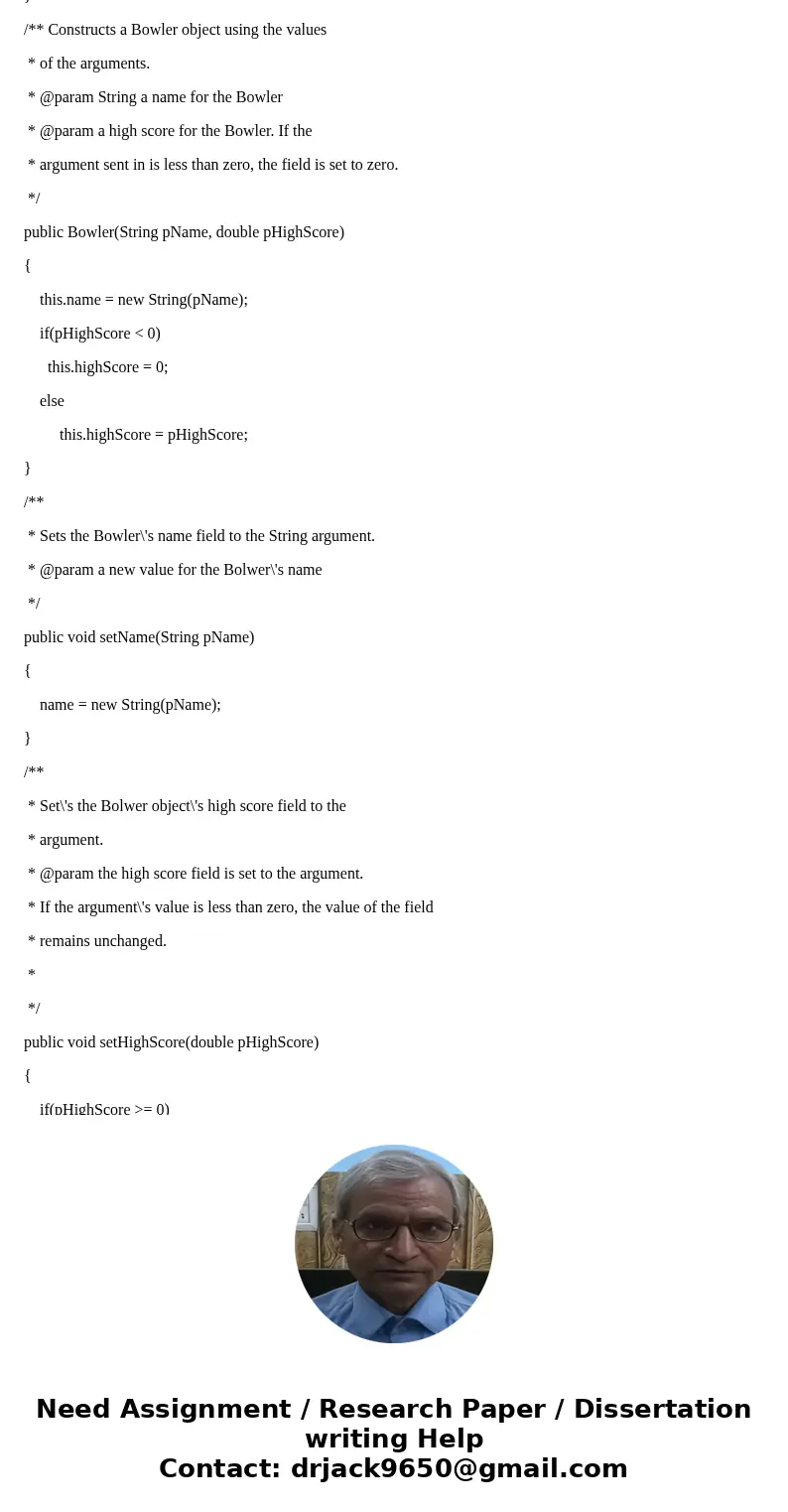
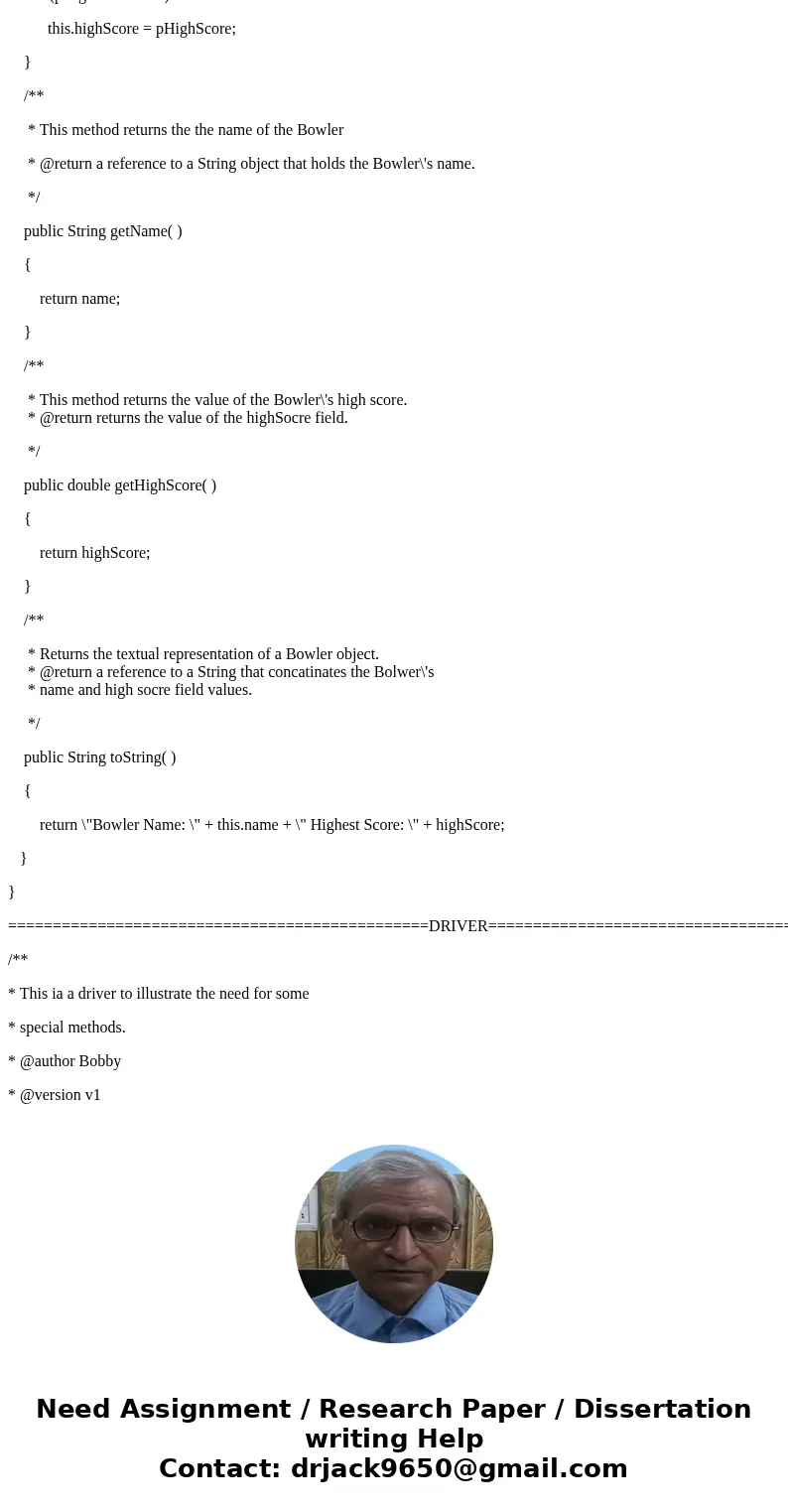
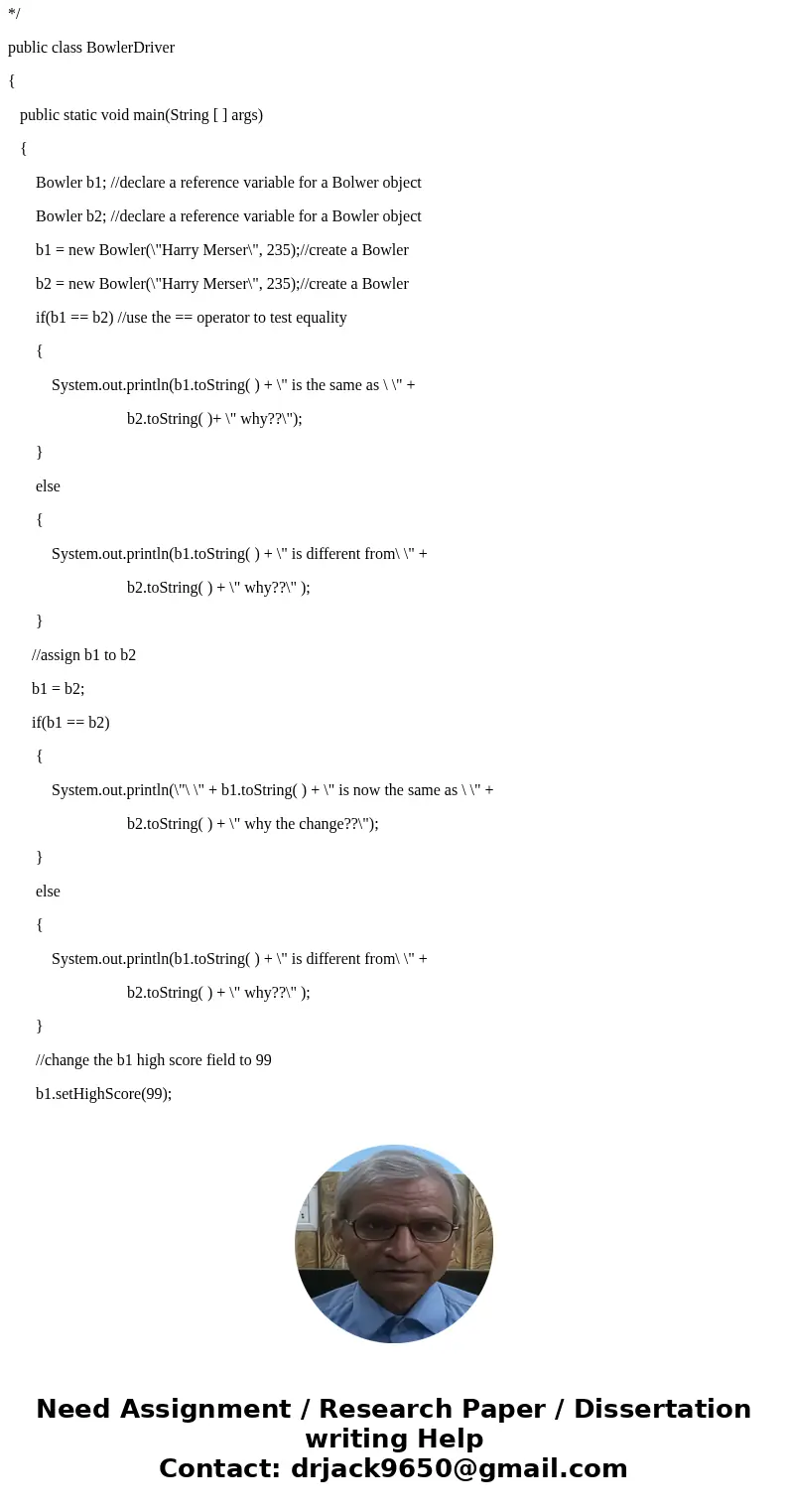
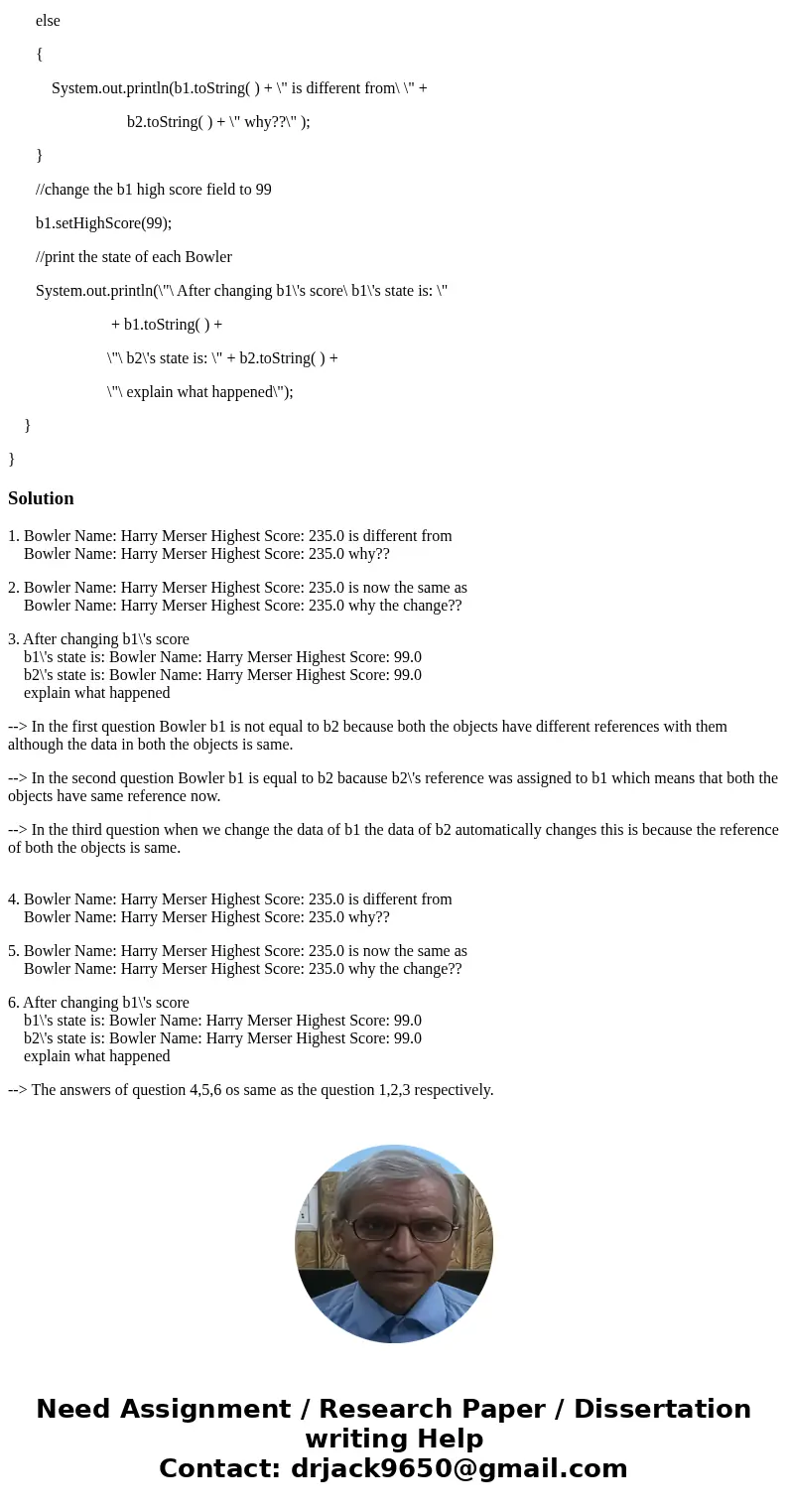
 Homework Sourse
Homework Sourse